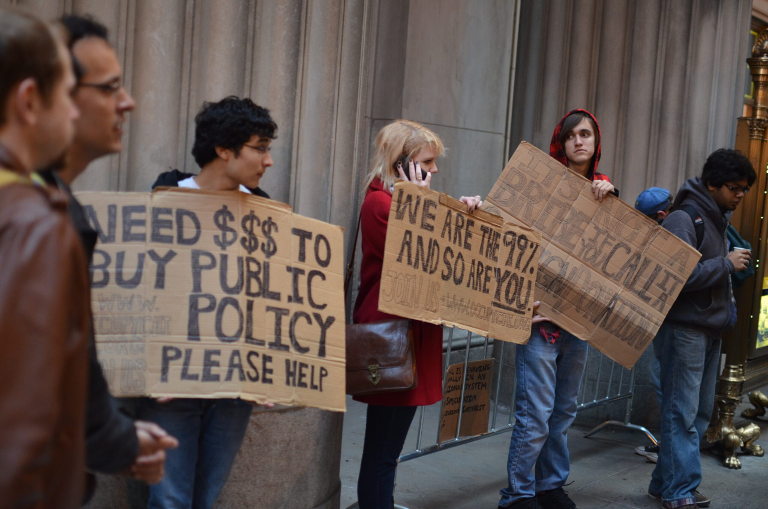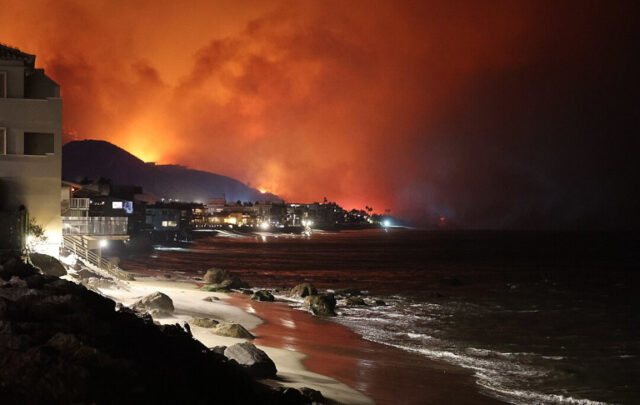This article was originally published on Waging Nonviolence in association with Resistance Studies.
The late anthropologist David Graeber, who wrote about the 5,000-year history of debt, spoke about a strange paradox of being indebted. “The first effect of debt is to create isolation, shame, humiliation, a fear of even talking about it. On the other hand, if you look at history, the vast majority of revolts and insurrections are about debt. So in a sense it’s incredibly effective, ideologically, at isolating people. But once people overcome that isolation, the results are always explosive.”
We may be heading towards such a moment.
In June, we learned that Americans had been skipping millions of debt payments in the wake of coronavirus shutdowns. That’s what happens when a vast sea of workers living paycheck to paycheck see their income reduced. The $600 boost to unemployment insurance kept many households afloat, but the extra funds weren’t enough for those living in high-cost areas and many still working had seen their hours cut and wages lowered. With the additional unemployment benefits reduced to $300 for several weeks now, millions of households are struggling to afford basic needs. Yet even that support is already ending in several states, leaving the jobless with standard unemployment insurance that on average only covers about 40 percent of their previous pay. With job opportunities shrinking as the shutdowns continue, many will be forced to live on that meager income over a long period — perhaps until that, too, expires.
We haven’t yet seen the catastrophic consequences of the stoppage in payment. Loan deferments and moratoriums on eviction have provided protection thus far. But a mountain of unpayable debt is piling up and creditors may demand far more than families can afford when these programs expire. The finance industry is readying itself for a wave of defaults. In a matter of months, millions of people could suffer foreclosures, evictions, car repossessions, and credit score downgrades that could block access to a home, a vehicle, or other essential assets long into the future. State budgets are also a disaster — balanced budget requirements in nearly all state constitutions guarantee vast cuts to social services if the federal government doesn’t provide needed funding. Corporate politicians are salivating at the prospect of workers having their pensions cut to fill the gap.
This debt crisis was long in the making. Households’ debt-to-income ratio was less than 40 percent in 1950. It grew steadily since the mid-1980s and then increased dramatically in the years up to the Great Recession, peaking around 120 percent when total household debt reached almost $13 trillion. At the beginning of 2020, before the shutdowns began, it stood at a record $14 trillion. To a significant extent, families were forced into debt through decades of stagnant wages and increasing cost of living.
Both of these phenomena are a natural outcome of businesses seeking to maximize profits by increasing revenue (prices) and minimizing costs (wages). If all wages had risen with worker productivity over the past 40 years, full-time minimum wage workers alone would be making $24 per hour ($48,000 per year) — most people would have sufficient income to afford a comfortable lifestyle. Instead, poor and middle-class households have relied on credit to survive, which means much of today’s debt cannot be attributed to individuals’ wasteful spending. Any additional debt resulting from the economic slowdown during the pandemic clearly isn’t their fault.
Graeber reminded us that people have often carried their indebtedness as a personal failing, a burden borne by millions with secret shame. Soon we will realize just how widely these chains are shared. The coronavirus shutdowns aren’t the main reason we have a debt crisis, but by reducing incomes they are accelerating the inevitable reckoning.
Economist Michael Hudson’s work shows that ancient societies also had to face the destabilizing impact of unpayable debt. Their solution, for thousands of years, was the jubilee: the periodic cancellation of personal debts. The purpose was to prevent social collapse by keeping household wealth from being completely redistributed into creditors’ hands. Creditors “were blamed for impoverishing society at large by their selfishness,” Hudson writes. “The Greeks called [it] hubris, money-love and wealth addiction.” How times have changed. Now we have a creditor morality that makes all debt seem legitimate, as if debtors’ interests have no moral standing. We are used to banks and landlords getting what they want at the expense of workers, an inevitable result of the prevailing belief that all of our debts and those of others always ought to be paid.
The debt crisis has two modes of resolution. It will either unleash mass homelessness and widespread financial ruin or force elites to cancel debts long treated as sacred. Social movements must seize this moment: either route offers an essential lesson for the public that activists must ensure is learned. If the public is robbed during a pandemic to protect creditors’ profits, it will further demonstrate the illegitimacy of our hierarchical social relations and could spark a revolt. If some level of household debt is eliminated, it will undermine the supposed rules of our economic system and reveal its true malleability.
Activists must be ready to steer either course towards a transformation of society. We have recently seen how organizing by the Debt Collective, a debtors’ union movement, led politicians to put forward proposals to cancel student loans. But the debt burden is so widespread that it can help trigger momentum towards a new society, and all mass movements should incorporate illegitimate debt into their narrative and debt cancellation into their political platform.
Several movements recently wrote an open letter to Joe Biden calling for student loan relief, including climate activists, who in particular should be aware of the mobilizing power of unpayable debt. Mounting ecological crises that threaten our existence, led by the risk of climate breakdown, illustrate the need for deep social reorganization. To have any hope of a livable future, we must transition from a profit-maximizing economy to one that prioritizes ecological stability and a just distribution of wealth.
This transition depends on a widespread political awakening and a surge of self-organization that can put social movements in control of government. We build this momentum as the public realizes that systems of concentrated power will destroy society and can no longer be tolerated, and that a fundamentally different economy is possible. These are lessons illustrated powerfully by the debt crisis.
Suppose the first option is taken, and creditors begin to strip millions of families of any assets they have. I believe that the sickness and death resulting from coronavirus — much of it preventable — should already be more than sufficient to lay bare the illegitimacy of the present order. But the debt crisis it is triggering might offer an even more direct illustration. Those unharmed by the virus may find themselves overwhelmed by its economic effects, and those ravaged by sickness will see their burden grow at their most vulnerable moment. What happens when millions suddenly share the experience of being besieged by the finance industry amid a pandemic?
The next step depends on the prevailing narrative and on efforts to organize a focused response. People can tolerate extensive misery when they believe it to be natural or inevitable. To the extent that we believe our debts are legitimate, we will accept our suffering when we inevitably cannot pay them. For such harm to generate appropriate outrage and spark political participation, individuals must know how deeply they’ve been wronged. Activists must spread the understanding that elites enriched themselves by forcing the public to survive on credit, and amplify the narrative that we have accumulated debt unworthy of repayment.
With the country united in its suffering at the hands of banks and landlords, we may see an uprising. Activists must plan ahead to guide events in a positive direction. We must ensure elites cannot scapegoat the most vulnerable for the pain they have caused. And we must have clear demands — for example: debt cancellation, secure housing, frequent relief payments to households until the virus is contained and a job guarantee thereafter, and a rapid decarbonization program. If the outrage over this injustice can be channeled into ongoing demonstrations and electoral organizing and remain focused on advancing a specific policy platform, we might just win fundamental changes not long ago considered impossible.
The second option for resolving the crisis, in which some debt previously treated as sacred is eliminated, offers another crucial lesson. We are regularly told that implementing progressive policies would destroy society. We are made to believe that nothing can change. Debt is a crucial mechanism of social control and perhaps the central emblem of supposedly inviolable economic laws. To see it disappear can be a revelation, a vivid example that we are not bound by the rules elites demand that we respect.
Generally, debts should be repaid. But under certain circumstances, like when individuals have little choice, and are forced to take on excessive debt or when the consequences of repayment are severe, the moral and economically sound response is to cancel it. The elimination of some level of debt is long overdue, and if there are repercussions for the financial system, like the failure of some private banks, then the government can reconstitute them into public banks mandated to serve community needs instead.
A transformation towards an ecologically sustainable and just economy requires the public to have sufficient confidence that the changes we seek are necessary and possible. Mainstream economists and business leaders will relentlessly attempt to undermine support for the transition by convincing the public that these changes are impossible or would lead to chaos. Activists must cultivate an economically literate population to ensure these arguments fail, or economic myths may block the path to a new economy.
It tends to take a crisis for economic myths to be exposed to the world. Consider that during the Great Recession elites were forced to reveal that the federal government can create large sums of new money at any time. However, that power was quickly obscured when they asserted it was a debt the public must repay through austerity. Without large-scale organizations dedicated to instilling the reality of money creation in the public mind, a new consciousness did not sweep the nation.
Meanwhile, the supposed sanctity of debt remained completely intact. Banks were allowed to foreclose on millions of people when the government could have written down their mortgage debt to a realistic value or eliminated it instead. Coronavirus has again forced elites to demonstrate the reality of money creation, reminding us that funding for public priorities is not scarce despite ceaseless efforts to make us think otherwise.
This time, though, it may also reveal that debt truly isn’t sacred. But we should anticipate attempts to obscure the lesson. Debt relief might occur through the federal government creating new money to pay off loans, what heterodox economist Steve Keen calls a “modern jubilee” — that way the banks are paid and no debts are directly cancelled. Either way, activists must focus the public’s attention on the fact that debts can be wiped away if there is sufficient political will.
These are powerful lessons. It is the responsibility of all those who wish to create a livable future to teach them. That includes academics, independent media outlets and non-profit organizations. Social movements already pushing for far-reaching change must recognize this mass education task as central to their work. These essential lessons threaten elites’ core interests, and those in power will do everything they can to bury them and nullify any uprising. Corporate media outlets cannot be expected to provide sufficient attention or sympathy to a revolt over debt. If we assume that these lessons are learned automatically, we won’t put in the necessary effort to educate the public. That’s a major reason why even the most revealing events don’t translate into a new consciousness.
The coronavirus pandemic and the economic mayhem arising in its wake are causing vast suffering. The key is helping the public to recognize that much of it was preventable and that no future is possible as long as the interests of the wealthy remain the guiding priority of our society. It is difficult to imagine events better poised to trigger fundamental change. These crises offer a vivid illustration of the cruel nature of elite rule and expose economic myths that have long convinced everyday people that their deprivation is inevitable. There is an opportunity here to open up space for a new society to emerge. Activists must seize it.
Teaser photo credit: Activists with Occupy Chicago protest the response to the 2007-2008 financial crisis in 2011. (Flickr/ Michael Kappel)






